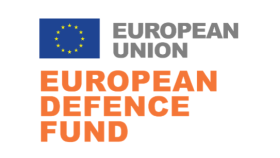
European Defence Fund (EDF)

(updated on 18 December 2025)
European Defence Fund (EDF): Driving innovation in European security and defence research
The European Defence Fund (EDF) is the European Commission's primary funding mechanism for bolstering research and technological development in the defence sector. The programme aims to promote sustainable European cooperation, technological sovereignty and competitiveness in the defence sector, from basic research to market-oriented development.
Objectives of the European Defence Fund
The EDF supports projects that:
- strengthen cooperation between companies, research institutions, and SMEs in the EU
- develop innovative, interoperable defence technologies and capabilities
- Pool strategic investments in security and defence by European countries
- reduce fragmentation and promote industry standards
- increase European resilience to security policy challenges.
Budget and funding framework
Approximately €7.3 billion is available for the period 2021–2027:
- €2.7 billion for cooperative defence research
- €5.3 billion for capability development (in addition to national funds).
Funding is mainly provided in the form of grants. Research activities can receive up to 100% of eligible costs, while development activities require co-financing, which can be reduced through bonus schemes (including for SMEs, mid-caps, and PESCO).
Structure & priorities
The EDF is implemented annually through a work programme, covering:
- All military domains (land, air, sea, space and cyber)
- Cross-cutting technologies (e.g., AI, sensor technology, robotics, materials and energy systems)
- Disruptive technologies and defence innovation
The priorities are based on:
- EU security and defence objectives
- The Capability Development Plan (CDP)
- Coordination with the EDA, EEAS, and EU Member States
- Complementarity with NATO planning processes
Submission requirements
The following are generally required for an application:
- At least three organisations from three EU member states or associated countries (currently among others Norway)
- EU-based management
- A control structure outside of non-associated third countries (with exemption guarantees)
Organisations from third countries may participate, but only under strict security requirements and without EDF funding.
EDF Work Programme 2026
A total of approximately €1.006 billion in EU funding is available for the EDF Work Programme 2026. The programme includes:
- 8 calls for proposals, including research and development measures, accelerated and fast-tracked calls, and specific calls for disruptive technologies;
- 16 thematic categories, including cyber security, space, artificial intelligence and digitalisation, energy and environmental resilience, air, land and sea combat, as well as underwater and missile defence;
- Targeted measures for SMEs and start-ups, particularly through the EU Defence Innovation Scheme (EUDIS), including business coaching, accelerators, hackathons and the Defence Equity Facility.
- STEP reference: Seventeen measures contribute to the objectives of the 'Strategic Technologies for Europe Platform' (STEP).
Since 2021, the EU has mobilised a total of more than €5.4 billion for joint defence research and development through the implementation of the EDF.
EU Defence Innovation Scheme (EUDIS)
EUDIS supports start-ups, SMEs and mid-caps by:
- developing innovative defence technologies
- getting to market faster
- gaining access to financing, test infrastructure, and networks
Support from BayFOR
BayFOR informs, advises, and supports Bavarian stakeholders on:
- Funding opportunities in the EDF and EUDIS
- Interfaces with dual-use research and civil EU programmes, such as Horizon Europe
- Networking with national and European partners
- Consortium formation and strategies for competitive submissions
- Application support (administrative and technical and content-related)
Note: The EDF requires high security and compliance standards. Early consultation, especially with the German NCP EVF, is strongly recommended.
Contact at BayFOR

Dr. Alexander Christian Widmann
Team Coordinator and Scientific Officer Social Sciences and Humanities | Security and Defence Research
Phone: +49 89 9901888-162
Email: widmann@no-spam-pleasebayfor.org




